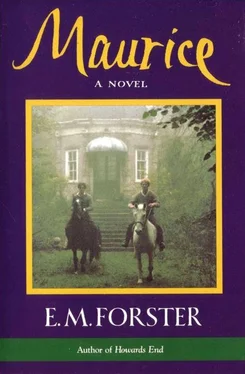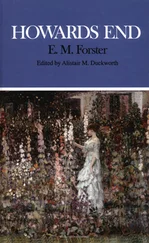"Our young friend condemns the entire Church, militant and triumphant."
Maurice roused himself. If the parson hadn't looked so damned ugly he wouldn't have bothered, but he couldn't stand that squinny face sneering at youth. Scudder cleaned a gun, carried a suitcase, baled out a boat, emigrated — did something anyway, while gentlefolk squatted on chairs finding fault with his soul. If he did cadge for tips it was natural, and if he didn't, if his apology was genuine — why then he was a fine fellow. He'd speak anyhow. "How do you know he'll communicate if he's confirmed?" he said. "I don't communicate." Mrs Durham hummed a tune; this was going too far.
"But you were given the opportunity. The priest did what he could for you. He has not done what he could for Scudder and consequently the Church is to blame. That is why I make so much of a point which must appear very trivial to you."
"I'm awfully stupid, but I think I see: you want to make sure that he and not the Church shall be to blame in the future. Well, sir, that may be your idea of religion but it isn't mine and it wasn't Christ's."
It was as smart a speech as he had ever made; since the hypnotism his brain had known moments of unusual power. But Mr Borenius was unassailable. He replied pleasantly, "The unbeliever has always such a very clear idea as to what Belief ought to be, I wish I had half his certainty." Then he arose and went, and Maurice walked him through the short cut through the kitchen garden. Against the wall leant the subject of their deliberations, no doubt awaiting one of the maids; he appeared to be haunting the premises this evening. Maurice would have seen nothing, so thick now was the darkness; it was Mr Borenius who exacted a low "Good night, sir" for them both. A delicate scent of fruit perfumed the air; it had further to be feared that the young man had stolen an apricot. Scents were everywhere that night, despite the cold, and Maurice returned via the shrubbery, that he might inhale the evening primroses.
Again he heard the cautious "Good night, sir," and feeling friendly to the reprobate replied, "Good night, Scudder, they tell me you're emigrating."
"That's my idea, sir," came the voice.
"Well, good luck to you."
"Thank you, sir, it seems rather strange."
"Canada or Australia, I suppose."
"No, sir, the Argentine."
"Ah, ah, a fine country."
"Have you visited it yourself, sir?"
"Rather not, England for me," said Maurice, strolling on and again colliding with corduroys. Dull talk, unimportant meeting, yet they harmonized with the darkness, the quietness of the hour, they suited him, and as he walked away he was followed by a sense of well-being which lasted until he reached the house. Through its window he could see Mrs Durham all relaxed and ugly. Her face clicked into position as he entered, so did his own, and they exchanged a few affected remarks about his day in town, before parting for bed.
He had taken to sleeping badly during the past year, and knew as soon as he lay down that this would be a night of physical labour. The events of the last twelve hours had excited him, and clashed against one another in his mind. Now it was the early start, now the journey with London, the interview, the return; and at the back of all lurked a fear that he had not said something at that interview that he ought to have said, that he had missed out something vital from his confession to the doctor. Yet what was it? He had drawn up the statement yesterday in this very room, and been satisfied at the time. He began to worry — which Mr Lasker Jones had forbidden him to do, because the introspective are more difficult to heal: he was supposed to lie fallow to the suggestions sown during the trance, and never wonder whether they would germinate or not. But he could not help worrying, and Penge, instead of numbing, seemed more stimulating than most places. How vivid, if complex, were its impressions, how the tangle of flowers and fruit wreathed his brain! Objects he had never seen, such as rain water baled from a boat, he could see tonight, though curtained in tightly. Ah to get out to them! Ah for darkness — not the darkness of a house which coops up a man among furniture, but the darkness where he can be free! Vain wish! He had paid a doctor two guineas to draw the curtains tighter, and presently, in the brown cube of such a room, Miss Tonks would lie prisoned beside him. And, as the yeast of the trance continued to work, Maurice had the illusion of a portrait that changed, now at his will, now against it, from male to female, and came leaping down the football-field where he bathed… He moaned, half asleep. There was something better in life than this rubbish, if only he could get to it — love — nobility — big spaces where passion clasped peace, spaces no science could reach, but they existed for ever, full of woods some of them, and arched with majestic sky and a friend.
He really was asleep when he sprang up and flung wide the curtains with a cry of "Come!" The action awoke him; what had he done that for? A mist covered the grass of the park, and the tree trunks rose out of it like the channel marks in the estuary near his old private school. It was jolly cold. He shivered and clenched his fists. The moon had risen. Below him was the drawing-room, and the men who were repaying the tiles on the roof of the bay had left their ladder resting against his window sill. What had they done that for? He shook the ladder and glanced into the woods, but the wish to go into them vanished as soon as he could go. What use was it? He was too old for fun in the damp.
But as he returned to his bed a little noise sounded, a noise so intimate that it might have arisen inside his own body. He seemed to crackle and burn and saw the ladder's top quivering against the moonlit air. The head and the shoulders of a man rose up, paused, a gun was leant against the window sill very carefully, and someone he scarcely knew moved towards him and knelt beside him and whispered, "Sir, was you calling out for me?… Sir, I know… I know," and touched him.
38
"Had I best be going now, sir?" Abominably shy, Maurice pretended not to hear.
"We mustn't fall asleep though, awkward if anyone came in," he continued, with a pleasant blurred laugh that made Maurice feel friendly but at the same time diffident and sad. He managed to reply, "You mustn't call me sir," and the laugh sounded again, as if brushing aside such problems. There seemed to be charm and insight, yet his discomfort increased.
"May I ask your name?" he said awkwardly.
"I'm Scudder."
"I know you're Scudder — I meant your other name."
"Only Alec just."
"Jolly name to have."
"It's only my name."
"I'm called Maurice."
"I saw you when you first drove up, Mr Hall, wasn't it Tuesday, I did think you looked at me angry and gentle both together."
"Who were those people with you?" said Maurice, after a pause.
"Oh that wor only Mill, that wor Milly's cousin. Then do you remember the piano got wet the same evening, and you had great trouble to suit yourself over a book, didn't read it, did you either."
"How ever did you know I didn't read my book?"
"Saw you leaning out of the window instead. I saw you the next night too. I was out on the lawn."
"Do you mean you were out in all that infernal rain?"
"Yes... watching… oh, that's nothing, you've got to watch, haven't you… see, I've not much longer in this country, that's how I kep putting it."
"How beastly I was to you this morning!"
"Oh that's nothing — Excuse the question but is that door locked?"
"I'll lock it." As he did so, the feeling of awkwardness returned. Whither was he tending, from Clive into what companionship?
Читать дальше












